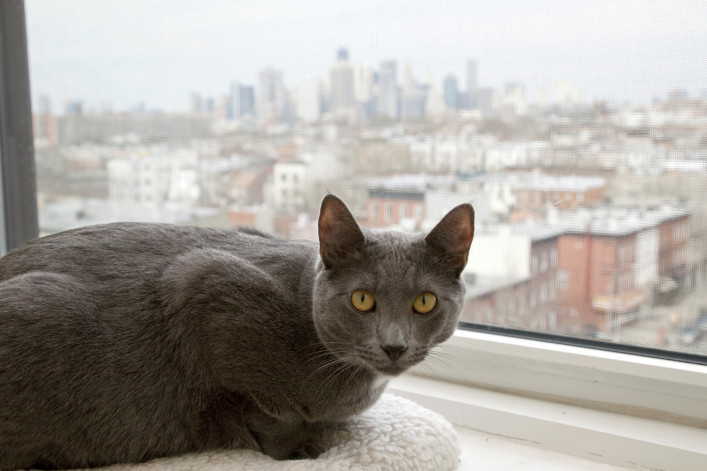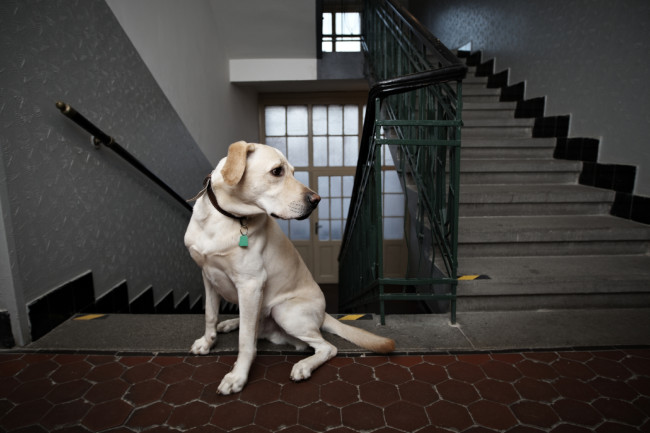4 key questions to ask before you live with a pet in NYC

Provided they're allowed in your building, a furry friend is a welcome addition to just about every New York apartment. But living with an animal in a small city apartment comes with an extra set of considerations, and before you sign off on that adoption paperwork (and yes, it's much better to adopt an animal instead of buying one), there are a few questions you should ask about your apartment, your roommates (if applicable), and the animal itself to ensure that you'll all be living as happily as possible.
"It’s a big responsibility, it’s having an extra roommate," as Jordana Serebrenik of City Critters puts it. "You want to make sure that everyone in the home has that same sense of responsibility [for the pet]."
Can the apartment be set up to accommodate a pet?
While there are obvious issues of size as far as dogs are concerned—for example, an enormous, energetic dog probably shouldn't be confined to a studio apartment—it's also important to consider the general safety of your space before bringing an animal into it.
"It's important for apartment owners to ensure that there are screens on all the windows," notes Adi Hovav, a senior feline behavior counselor with the ASPCA. Both cats and dogs are vulnerable to an effect known as "high-rise" syndrome, where they can't gauge how high up they really are in a building, sometimes resulting in falls out windows and off balconies.
With this in mind, if you have a balcony, terrace, or backyard, it may not be an ideal place for a pet (particularly a cat). "There's really no safe outdoor environment in an urban setting like New York City," says Serebrenik. Of course, it's a bonus if you have a dog and a backyard, but you'll still probably want to keep them supervised when they're out there.
For pure quality of life, Hovav recommends that cat owners consider extra shelving to create more vertical space in a small home, the better for your feline friend to explore and feel that they have their own territory.
What's the animal's personality, and is it apartment-friendly?
This is maybe the biggest factor to take into consideration, and a responsible shelter should be able to provide you with a rough idea as to a dog or cat's personality traits.
It's of particular concern when it comes to dogs. "If prospective adopters are concerned about a dog's suitability for life as an apartment pet, there are a few questions they can ask to help make an informed decision," ASPCA animal behavior counselor Dana Ebbecke tells us. "The first thing they can check is whether the dog has a history from a previous home about their behavior. If the pet has a history of excessive vocalization [Editor's note: if they bark a lot], for example, he or she may not be suitable for a thing walled apartment."
And even if a dog doesn't come with information from a previous owner, Ebbecke says "prospective adopters can ask how the dog's behavior has been in the shelter and ask what steps they can take to help the dog adapt to their new home."
As for cats, says Serebrenik, "Pretty much any cat is OK in an apartment, unless, for instance, you work from your apartment and there are a lot of people coming and going and opening the door. In that case, you want a cat that's a little less likely to try to charge out the door every time it's opened." You also want a cat with a personality that's suited to your schedule—for instance, a less social kitty if you know you spend 60 hours a week at the office.
"If it's a needy cat that wants to be on laps all days, and you're barely home, that's not a good match," she explains. "Think about what your schedule is really like, or consider getting more than one, so they have each other and aren't feeling alone or ignored."
If the pet belongs to a prospective roommate, what is their routine?
Whether you're moving into an apartment where a pet already resides, or considering shacking up with someone that comes with an animal in tow, you'll want to make sure you're not shacking up with an irresponsible pet owner—and setting yourself up to be stuck with the side effects.
"If you're looking to move in with a roommate who has an animal, you'll want to make sure that person is attentive and that their schedule is accommodating to the pet," says Serebrenik. "Does your roommate go stay at their boyfriend or girlfriend's place every weekend and dump the pet on you? Are they looking for a live-in pet sitter? If you're a pet lover and you see a pet that's sad and whining for attention, you're going to feel bad, and responsible."
She also recommends asking what their routine is as far as medical care, walking (if applicable), and feeding, to help you get a sense of whether your roommate truly has a care routine in place, or if the responsibility will fall to you because you happen to be home.
In the case of a puppy, Ebbeck recommends asking what their hours are for training and socializing the pup, and if someone can stop by during the day to give it bathroom breaks, or if they'll consider doggy daycare.
For cats, says Hovav, assuming no one's allergic, discuss ahead of time where the little box will be kept, and who will be responsible for keeping it clean. "Roommates should also discuss whether the cat scratches on furniture and if there are concerns, coming up with a plan to make sure the cat has appropriate scratching posts available and that the cat's nails are regularly trimmed," says Hovav. "Last, it is a good idea to ask about whether the cat is vocal. Some may not appreciate a talkative kitty!"
What will be the animal's turf in the apartment?
This question applies to all pets that will be roaming around a household, but is particularly pertinent for cats, who are famously territorial.
"Roommates should discuss any concerns about where the cat will have access (for example, if someone prefers the cat not to go int their bedroom, they will need to commit to keep their door closed all the time," says Hovav. "Also, it's helpful to know how the cat does with strangers, especially if there are regular guests coming into the apartment, and coming up with a plan for shyer cats who don't enjoy the company of new people, such as keeping the cat in a quiet room while guests are there."
And if you're coming into a situation where the cat was there before you, Serebrenik suggests asking if the pet previously had access to the room, and if it may be a problem if you don't want to let them in. "If you keep your door closed, will it be a problem, where the animal is used to being in there and is now scratching or braying at the door. Maybe your room is the sunny room and they know in the mornings the sun comes in there."
Ultimately, it all comes down to being on the same page with everyone in your household to ensure that you, your pet, and any roommates can all cohabitate in harmony. And of course, though the focus here is on cats and dogs, even if you're thinking about taking on an, er, more unorthodox animal, a lot of the same questions about temperament, routine, and cleanliness still apply. After all, whether you want to cuddle up to a cat, a pig, or an iguana, you still need to make sure it's a good fit for your apartment.

























